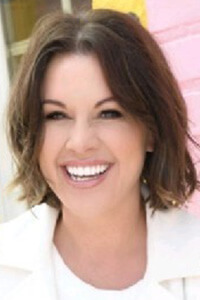
Musician Ciaran Gribbin leads PCMA EduCon 2019 attendees in a song during a session about team building. Creating engaging future events will partly involve more active audience participation, says one events organizer. (Jacob Slaton Photography)
I’ve read enough about the downside of multitasking to try to focus on one thing at a time. But I make an exception when it comes to podcasts — there’s no cognitive fatigue caused by listening to them on walks, during long drives, and while crocheting, my favorite way to do two things at once.
As an exploration of how the COVID crisis has impacted the business events industry, “Events UnPaused” — Maritz Global Events’ five-part podcast hosted by President David Peckinpaugh — is chock-full of insights and most definitely worth a listen.

Megan Henshall
The final episode, “The Future of Events and Where the Industry Is Going” — which you can play at the bottom of this page — pulled together the themes covered in the first four episodes and compelled me to put down my crochet hook and pick up a pen to take notes. Here are some takeaways from Megan Henshall, CMP, DES, global events accounts manager at Google:
Like everyone else in the industry, Henshall said, the pandemic caused Google global events to completely reimagine experience design. “We’re also designing for a dramatically different society coming out of all that we endured and survived last year, so we’re really looking at human-centered design based on post-COVID,” Henshall said, in terms of “appetites, priorities, and behavioral trends. So that’s something … at the heart of how we’re thinking about the future right now.”
Naturally, digital and hybrid are part of an omnichannel engagement strategy, Henshall said. “They are not going anywhere. They are here to stay. Now we have to do all the things well. So we’re looking at how we build out and scale up skillsets, resources, and talent around all of that — digital, hybrid, and in person,” she said, adding: “It is a really exciting time to be in this business.”
Business continuity is top of mind now, she said, and “we’re moving into experimentation, piloting, innovation, and even more meaningful collaboration across our industry.”
Henshall shared what she called the “4 Cs” — four pillars to keep in mind when designing engaging and impactful events in the digital, hybrid, and face-to-face space.
Community — this applies across all experiences, Henshall said. It’s no longer about the content “or the snazzy speaker,” she said. “It’s about bringing people together for meaningful connection and allowing them to learn socially from one another and engage as a community.”
Co-creation — Henshall thinks we’re moving into much more active audience participation. “They want a seat at the table; they want to have a say in how they’re engaging,” she said. “So I think creating co-creating opportunities for your audience is really important so they feel seen and heard.”
Choice — this is an offshoot of co-creation, Henshall said, and thing that she’s “most excited about exploring in our work. … We lost control of so much in 2020,” she said, “and now we want autonomy over our own experiences. And as our priorities have shifted, I think we need to invite people to engage with us in ways that make sense to them and meet them where they are. So I think offering choices inside that omnichannel mix is really important.” She said that the way you communicate around that is a really big opportunity.
Collaboration — Henshall thinks business events professionals need to be tapping into the gaming community, the forum community — “these online communities that are already successful and very established and doing it well in creating safe spaces for people. I think collaboration is key. We don’t have to have all the superpowers — even the Avengers were a team,” she said. “The more we bring in people outside of our niche disciplines and domains and invite them to help us do this correctly and as optimally and innovatively as we can, the more we’re going to get it right.”
Michelle Russell is editor in chief of Convene.
